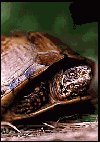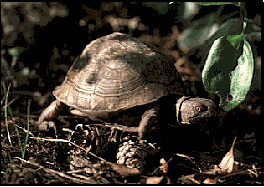|
Box turtles are typically rather shy animals which do not 'tame' easily. They are also very sensitive indeed to incorrect environments, and do particularly badly if kept in 'fishtank' type vivaria. They do much better when kept in well shaded, heavily planted outdoor pens with a damp moss and leaf-litter substrate, and constant access to a shallow bathing pond. Major problems quickly develop if they are overheated or allowed to become too dry. Box turtles MUST have access to humid substrates and micro-climates in eye, nose and ear infections are to be avoided: in the wild, they spend a lot of time buried in damp earth, and even mud. If kept in a dry vivarium tank they will suffer severe, and possibly fatal, dehydration very rapidly indeed. If they must be maintained indoors, it is vital that they are sprayed and soaked on a daily basis. They do not like bright light, and hot basking lamps cause more problems with box turtles than they cure…. a gentle, all-round background heat is preferable. Do remember that this is a temperate species, not a tropical species: box turtles need cooler days just as much as they need warm days. Their favorite weather is warm and overcast - just before a storm. In fact, peak activity is often observed during, or just after a heavy summer rainfall. Unfortunately, thousands of box turtles are still collected annually to supply the demands of the pet trade. Most of these turtles - which live for decades in the wild - will die within 12 months of capture. The Tortoise Trust is strongly opposed to the box turtle trade, which is unsustainable and involves very substantial cruelty. Rescued turtles are often in a bad way, with ear abscesses and eye infections commonplace. Parasitic diseases are also routine in wild-caught box turtles. The Tortoise Trust has a free video on the Rescue and Rehabilitation of American Box Turtles (available to registered wildlife rehabilitators) and we also have several useful articles in our on-line file library.
|
|




